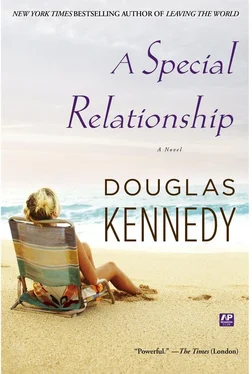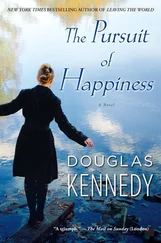'I think he might have been the most extraordinary man I've ever encountered... though, at the time, I wondered if his goodness was some sort of post-traumatic disorder. Isn't that an awful thing to think?'
'It's honest'.
'Anyway, Sandy and I agreed that we should settle for whatever their insurers demanded. Which was essentially all our parents' insurance policies, the house, and just about everything else. So we both came out of it with virtually nothing. Our own lawyers kept telling us we should fight our corner - that giving them the insurance policies was enough. But we felt so desperately guilty we handed it all over to the minister and his children... even though he actually called me once and said we didn't have to go so far. Can you imagine someone saying that... not seeking revenge or retribution? But it convinced us even more that we had to give him everything. It wasn't just penance. It was an act of contrition'.
'But you didn't drive the car', Julia said. 'Your father did'.
I fell silent for a while, wanting not to say any more. But then: 'You're right, he drove the car. But before he got into the car, he was with my mom at a college graduation party for me. He was having a great time, talking with all my friends, being the usual nice guy that he was. Late in the evening, I handed him a glass of shitty Almaden wine, and he said he really couldn't handle anything more, and I said - and I remember this so damn clearly - "You going middle-aged on me, Dad?" And he laughed and said "Hell no," and downed it in one go. And' -
I stopped. I looked down into the vodka glass. I shoved it away.
'I still can't get over it. All these years later. It's there, every hour of every day. And it's now been with me so long that I just consider it part of my weather system - something that encircles me all the time'.
'What did your sister say when she found out?'
'That's the thing - she never did find out. Because I couldn't bring myself to tell her...'
'Whom did you tell?'
I didn't answer. Finally she asked, 'You never told anyone?'
'I spoke with a therapist about it. But' -
'You never said a word to your husband?'
'I considered telling him around the time I got pregnant. But I thought... I don't know... I thought Tony would have belittled me for holding on to such guilt. He would have said I was being pathetic. Now I realize that, had I told him, he would have turned this admission against me in a court of law. Not just a misfit mother, but an accessory after the fact to a vehicular manslaughter'.
'But hang on - you don't really believe that you were responsible for the death of that woman and child?'
'I gave my dad the glass of wine that sent him over the limit'.
'No - you just handed him the glass and then gently teased him about being middle-aged. He knew he had to drive after the party. He knew how much he'd drunk before you showed up with that last glass of wine'.
'Try telling my conscience that. Sometimes I think that the real reason I eventually fled overseas was because I was trying to put as much geography as possible between myself and all that lingering guilt'.
'The French Foreign Legion approach'.
'Exactly - and it kind of worked for a while. Or, at least, I learned how to cohabit with it'.
'Until they took Jack away from you?'
'I guess I'm that obvious. And yes, once this all happened, I was certain that this was some sort of cosmic retribution for causing that accident; that Jack had been taken away from me because I had given my father the drink which made him crash the car which killed a little boy'.
Julia reached over the table and put her hand on my arm.
'You know that's not true'.
'I don't know anything anymore. During the last few months, all logic's been turned on its head. Nothing makes sense'.
'Well, one thing must make sense. You are not receiving some sort of divine punishment for your father's accident - because you had absolutely no role in that accident, and because it just doesn't work that way... and I speak as a semi-practising Catholic'.
I managed a small, bleak laugh.
'God knows, I wish I'd confessed all this to my sister years ago'.
'But what good would that have done?'
'Recently, I've had this enormous need to confess all to her'.
'Promise me you'll never do that. And not just because I truly believe that you have nothing to confess. It would just drop all the guilt you've been feeling for all these years right into her lap. And - this is the real Catholic in me talking now - there are many things in life that are far better left unsaid. We all want to confess. It's the most human of needs imaginable. To ask for some sort of absolution for making a mess of things - which everyone before us has done, and everyone afterwards will continue to do as well. Sometimes I think it's the one great constant in all human history: the ability to screw it up for ourselves and others. Maybe that's the most terrible - and the most reassuring - thing about life: the fact that everyone's messed up like this before. We're all so desperately repetitive, aren't we?'
I thought about that later, as I sat at home staring at the list of alternative legal aid solicitors, supplied to me by the Law Society. There was an entire section of lawyers dedicated to Family Law - and all I could think was how, for these specialists in domestic dissolution, all stories must start to overlap or, at the very least, come down to a few basic plot points: He met somebody else... We fight about everything... He just doesn't listen to me... She feels she doesn't have a life beyond the house and the kids... He resents the fact I make more money than him. And all this dissatisfaction and disgruntlement and disappointment may, in part, be rooted in the usual bad match-ups, the usual inability to cohabit. But Julia was right: it also stems from a need for turmoil, for change... all of which might be linked to that very human fear of mortality, and the realization that everything is finite. It is this knowledge which makes us scramble even harder for some sort of meaning or import to the minor lives that we lead... even if it means pulling everything apart in the process.
I winnowed my new solicitor possibilities down to four names - all of whom I chose because they were located within walking distance of my house. No doubt, they'd all tell me the same thing: you're in a no-win situation. But I still had to find someone to represent me during the Final Hearing. I was about to start phoning up these four candidates, but it was now around five pm on Friday afternoon, which meant that I would either be talking to answerphones or secretaries who were itching to get home, and certainly didn't want to be speaking to a Legal Aid case so late in the day. So I decided to start working the phones first thing Monday morning - and would now treat myself to an extended walk by the river. I was still reeling a bit from the disclosure I'd made to Julia. But I didn't feel relieved or unburdened. Nor did I take great consolation in what she said. Though others can advise you to divest yourself of all guilt, the ability to do so is always impossibly difficult. The hardest thing in the world is forgiving yourself.
I found my jacket, put on a pair of shoes, and was heading towards the kitchen bowl where I always tossed my house keys when the phone rang. Damn. Damn. Damn. A part of me wanted to let the answerphone take it - because there was a break in the weather, and I really needed an extended stroll in the open air. But being a glutton for punishment, I reached for the receiver.
'Uh... I'd like to speak with Ms... uh... Goodchild'.
Wonderful. Just wonderful. Exactly the man I wanted to hear from late on a Friday afternoon. But I maintained a polite tone.
'Mr Clapp?'
'Oh, it is you, Ms Goodchild. Is this a good time?'
Читать дальше












